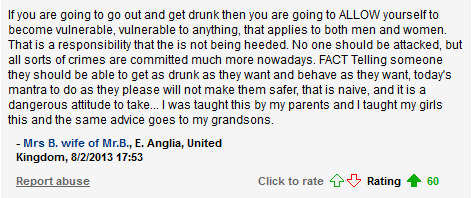
It’s a message about rape. Or, depending on your local police’s choice of definition, ‘regretful sex’ -oh, semantics! The campaigns are aimed at women, because when a woman is raped there are only 2 people to blame. Her or the girl friend who did not look after her, like a good friend should. It would seem these are the people who should stand trial. It would seem that these are the people who do.
Figures released from the Office of National Statistics reveal that 1 in 12 people believe the blame lies with the women who were raped if they flirted with their attacker or were drunk. 6% of people believe rape survivors are to blame if they have been drinking; this figure rises to 8% if the woman has taken drugs. 7% believe any flirting before the attack makes the attacked woman responsible.
| A Mrs B (for those unsure of how marriage works that means she is married to and the wife of Mr. B) is more equal rights on victim blaming. It would be interesting to know if she also teaches her grandsons and sons not to rape or take advantage of the vulnerable. | we need to focus on them once they are the victim, how can we help them, not how could they have helped themselves. |
Since English law recognised marital rape as a crime in 1991 it appears we have been hell-bent on downgrading the crime of rape. We find terms such as ‘regretful sex’, ‘serious rape’ or the Whoopi Goldberg coined “rape-rape” creeping into the vernacular. We want rape to have terms or grades. To continue in this vein is to hurtle towards such a thing as ‘mild rape’.
Justice Secretary Chris Grayling has called for police to make greater use of cautions. Grayling believes that this might be the only way in some cases of getting the offence of rape on an offender’s criminal record.
This was put forward in light of the continued low conviction rates in the UK for rape cases. When challenged by Labour MP Karl Turner that a caution is: “soft on criminals and harsh on victims” Grayling cited one of the problems of the low conviction rates: “If we take, for example, a caution for rape, something we would all view as being completely unacceptable, but in some cases where the victim is absolutely unwilling to give evidence, it may be the only way of getting something on the record about the offender.”
Perhaps the sentiment is correct, the idea is nonsense.
It doesn’t take an MP to make the link between the glut of victim blaming police campaigns and general attitudes to a reticence to give proper evidence. Instead of investing in making the process less traumatic for the survivor, encouraging and giving them the confidence to continue with dignity in making their case. By insisting police rape awareness campaigns focus on the rapist not the raped a shift in the attitude of the public, police and survivors could be made.
The Channel 4 blog Fact Check highlights the gap between reporting of rape and convictions: “On average, over the last three years, there were 15,670 rapes recorded by police per year. Of those, 1,070 resulted in convictions. That’s a rate of 6.8 per cent.” Fact Check reports that the Home Office collected information from 21 police forces who accounted for around 45% of rape allegations dropped due to a retraction.
If we want to focus on the victim we need to focus on them once they are the victim, how can we help them, not how could they have helped themselves. After Frances Andrade committed suicide former solicitor general Vera Baird QC raised concerns over the cross examination and how we treat the sexually abused in court. Andrade is one of many who have been left without enough support after huge trauma.
Now, is that death or regretful death?
Squeamish Kate




 RSS Feed
RSS Feed
